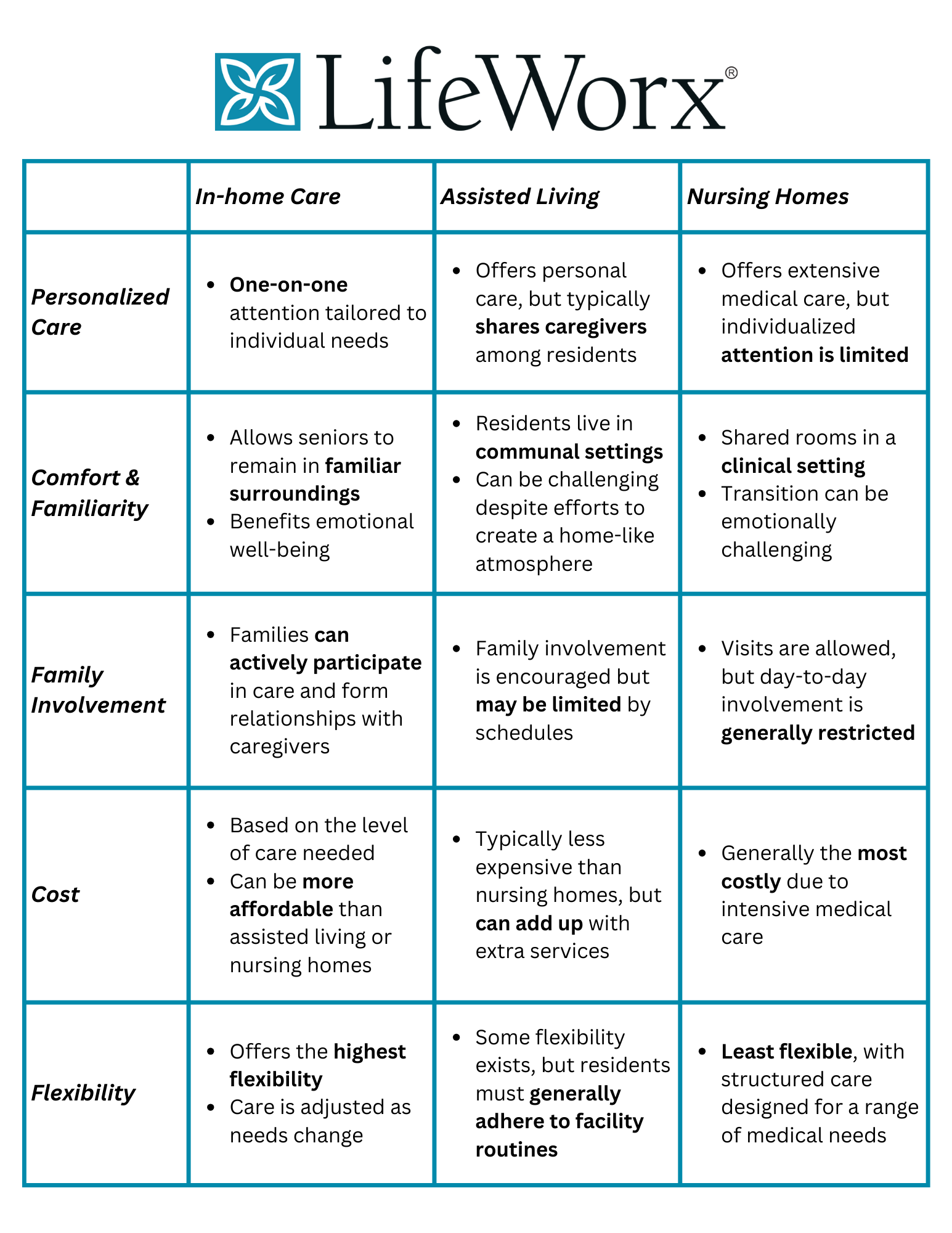
Caring for Elderly Parents
Caring for our elderly parents is one of the most personal and complex challenges we face. For some, it happens suddenly after a health crisis. Others may notice small changes in memory or mood that are easy to overlook at first.
Whatever the path, caregiving asks us to balance emotional, practical, and sometimes medical challenges while preserving our parent’s dignity and independence. This guide covers the biggest challenges and gives you realistic ways to handle them while keeping your relationship with your parents at the forefront.
Recognizing when help is needed
The first step in caregiving typically comes before any formal plan is set in place—noticing that something is changing. Sometimes the signs are so subtle they can be confused with normal signs of aging. Maybe mom repeats questions within the same conversation, or dad stops shaving his beard and forgets to pay a utility bill.
These indicators can be easy to miss, but they’re important to catch. The earlier you notice changes, the more options you’ll have. Watch for:
- Memory lapses or forgetfulness – missing appointments, repeating the same questions, getting lost in familiar places, or struggling to follow conversations.
- Changes in hygiene or self-care – neglecting grooming, avoiding bathing, or wearing the same clothes.
- Changes in mood – becoming uninterested in favorite activities, friends, or socializing.
- Mobility issues – having an unsteady gait, trouble getting up from chairs, or unexplained bruises from falls.
These changes don’t always mean a crisis, but they can signal the need for proactive measures. The next step is starting the conversation, ideally before you’re faced with urgent decisions.
Having the hard conversations
Discussing care needs with your parents can be uncomfortable, often evoking resistance, disagreements, and denial. Most older adults value their independence and may not be open to receiving care. Approaching conversations with empathy and patience is key.
Here are some ways to get the ball rolling:
- “I’ve noticed you’re having a harder time getting to the store. What would make it easier for you?”
- “How are you feeling about being here on your own? Are there things around the house that have become more difficult?”
- “If something changed with your health, how would you want us to handle that?”
- “I want to talk about what matters most to you if we ever have to make changes. Is that okay?”
- “I’ve been thinking about how we can make things easier for you. Would you be open to talking about it?”
Pushing too hard can cause resistance, so it’s important to frame your questions around their priorities.
Managing family dynamics
It’s helpful to check in with siblings and other family members early on. To avoid “he said, she said” misunderstandings, try to set realistic expectations and establish clear roles. For example, one sibling handles finances from another state, while another visits throughout the week. Holding regular family discussions, even on Zoom, can go a long way toward keeping everyone feeling informed and respected.
Family disagreements can be as exhausting as the care itself. In high stress situations, bringing in a third party, such as a geriatric care manager, financial planner, or elder law attorney, can ease tensions and provide guidance on difficult decisions.
Understanding care options
Family caregiving works best when there’s a support network in place, whether through family rotation or hired help. Family caregiving can be manageable if needs are minimal, but as needs change, you may have to explore other types of care options and what each entails financially.
From a financial perspective, costs can add up quickly.
- Family caregiving: May qualify for benefits or small stipends in some states
- In-home caregivers: Assist with personal care, meals, errands, and companionship. Agencies handle hiring, training, and scheduling – $30-$50/hour.
- Assisted living communities: Include meals, housekeeping, social activities, and help with daily tasks – $4,000-$6,000/month.
- Nursing homes: Provide 24/7 medical care for those with advanced medical needs – $7,500-$10,000/month.
When comparing these options, it helps to take tours, check online ratings, and speak with current residents or family members. It’s also important to factor in hidden costs, such as supplies, transportation, and potential legal fees. Your parents may also have a long-term care insurance (LTCI) policy that could cover the costs associated with activities of daily living in different settings. If you have questions about your parents’ policy, please contact our LTCI administrator.
Many families use a hybrid approach, where they use part-time in-home help to avoid burnout if round-the-clock care is needed. In-home care comes with a high degree of personalization and flexibility that traditional facilities can’t match.

Logistical challenges of caregiving
Once care begins, the day-to-day tasks can stack up quickly. Keeping track of bank statements, health insurance policies, legal documents, and medical records can feel like a full-time job. Without a system in place, it’s easy to become overwhelmed.
Here are a few ways to stay organized:
- Keep a shared calendar (like Google calendar) with appointments, scheduled visits, and medication refill dates
- Create a binder and digital folder with medical records, medication lists, insurance information, and emergency contact information
- Pill organizers or automated dispensers for medication accuracy
- Use mobile applications to keep family and friends updated
- Ensure important documents, such as durable powers of attorney, advanced directives, and living wills, are updated and accessible
You may want to work with a financial advisor or elder law attorney to review your parents’ assets or update key documents. These are critical for ensuring your parents’ wishes are honored if they can no longer advocate for themselves.
Caring for parents with dementia or Alzheimer’s
Taking care of someone with dementia can be very different from supporting someone experiencing normal aging. As cognition changes, so do personalities and communication styles. Caring for a loved one who is living with dementia requires adapting your approach to match their shifting cognitive abilities.
Example: Diana’s mother, who had Alzheimer’s, started accusing her of stealing things. At first, Diana was hurt and confused. She later realized these accusations were part of the condition. She stopped arguing and instead redirected the conversation when her mother would get agitated.
Practical strategies include:
- Using short, clear sentences and a calm tone
- Redirecting instead of arguing
- Keeping a consistent schedule
While general aging may bring occasional mobility issues, dementia or Alzheimer’s introduces new challenges like wandering. Small changes in your home can dramatically reduce the risk of injury and keep your parents safe. Here are some examples:
- Install grab bars in the bathrooms and near steps
- Use raised toilet seats and shower benches
- Improve lighting with motion-sensor lights and nightlights
- Clear walkways and remove tripping hazards
- Installing safety measures like locks on hazardous cabinets and door alarms to prevent wandering
In some cases, you may need to modify the home more extensively or consider memory care facilities.
Advocating in the healthcare system
The healthcare system can feel like a maze, making it difficult for seniors to navigate alone. As your parents’ best advocate, you can ensure they receive appropriate treatment and are not overlooked.
When dealing with healthcare providers, prepare before each appointment: bring a list of questions, write down any recent symptoms, and ask for explanations in plain language. If a treatment or procedure is denied by insurance, challenge the decision and ask for clarification in writing. Being an advocate isn’t about being difficult or challenging medical staff. It’s about making sure your parents get the care they need.
Caregiving isn’t about doing everything perfectly. What matters most is providing reliable, predictable support. No matter how you structure care, consistency is what builds trust.
For your parents, support might look like regular walks, going to church, listening to music, or staying in touch with friends and family. Routines offer comfort, reduce anxiety, and make life easier for everyone.
Equally important is taking care of yourself. When you prioritize your physical, emotional, and social health you’ll be better equipped to provide quality support. Many caregivers struggle with isolation, burnout, or anticipatory grief. Joining a support group, speaking with a professional, or hiring in-home support can help maintain balance. Caring for yourself isn’t a luxury, it’s an essential part of caring for your parents.

















